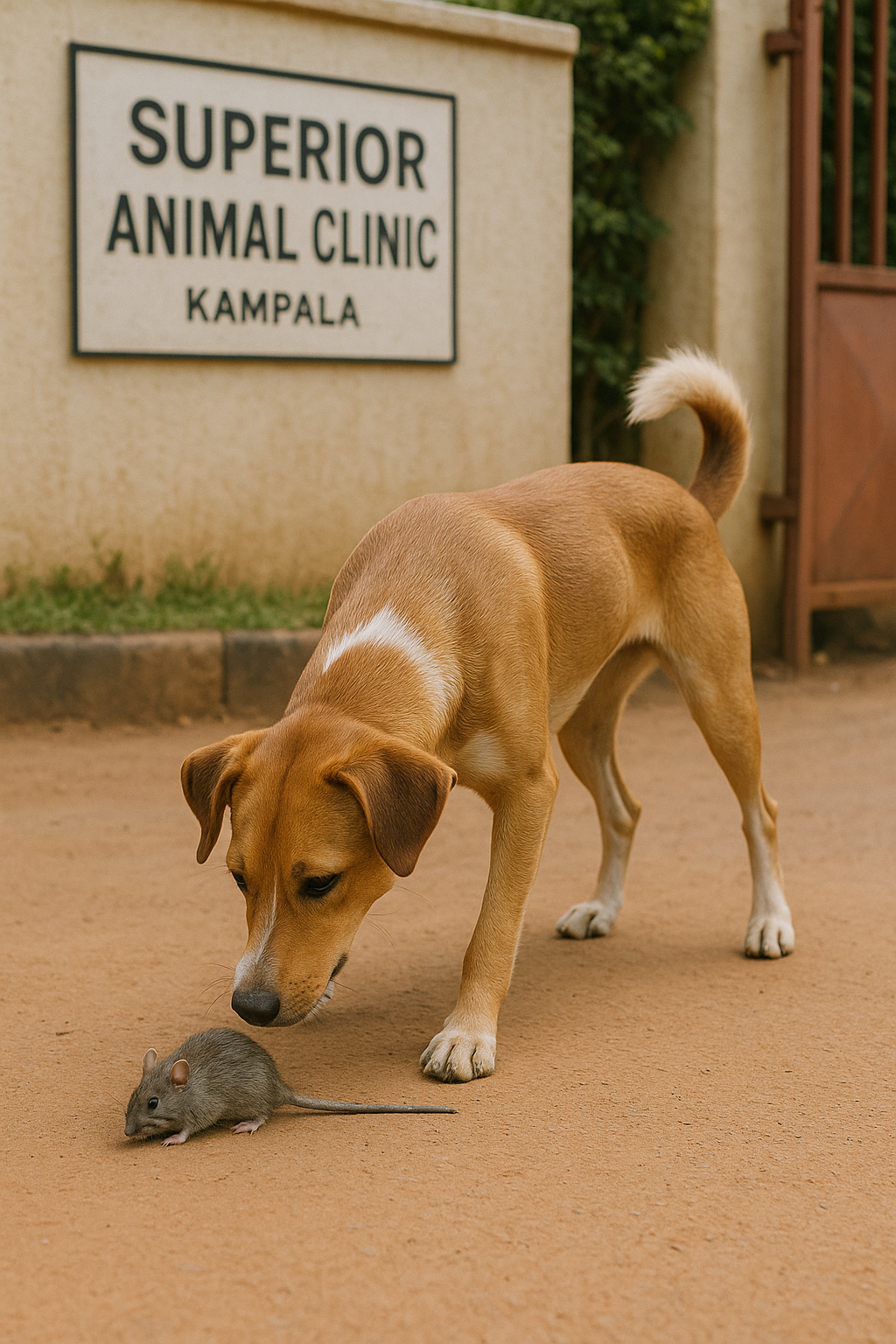
As a dog owner in Kampala, there’s nothing more worrying than seeing your furry friend acting sick. Maybe they’re lethargic, refusing their favorite meals, shivering, or even vomiting. You might wonder: “What’s happening to my dog?” One possibility is Leptospirosis, a serious bacterial infection that can affect your dog’s kidneys, liver, and overall health—and if left untreated, it can become life-threatening.
Whether your dog loves playing in puddles after the rains in Makindye or Nakawa, exploring backyards in Kololo or Bugolobi, or roaming around your neighborhood in Ntinda, Rubaga, or Muyenga, they could be at risk. But here’s the good news: with early detection, proper treatment, and preventive care, Leptospirosis is manageable, and your dog can make a full recovery.
At Superior Animal Clinic, we help dog owners across all neighborhoods in and around Kampala keep their pets healthy. In this guide, we’ll walk you through everything you need to know about Leptospirosis—from the signs to watch for, to the causes, treatment options, prevention tips, and home care advice. By the end, you’ll know exactly how to protect your dog and ensure they stay happy and healthy.
.
What is Leptospirosis in Dogs?
Leptospirosis is a bacterial infection caused by Leptospira bacteria. Dogs usually get infected through contact with contaminated water, soil, or urine from infected animals. It can cause serious damage to the kidneys, liver, and other organs if not treated promptly.
Common Symptoms of Leptospirosis in Dogs in Uganda
Leptospirosis can affect dogs of all ages, breeds, and sizes, but early detection is crucial to prevent serious complications. Dog owners in Kampala should be on the lookout for the following signs:
1. Fever and Lethargy
One of the first signs of Leptospirosis is a high fever, often accompanied by shivering or weakness. Your dog may seem unusually tired, unwilling to play, or reluctant to go for walks. In Kampala’s hot and humid climate, lethargy can sometimes be mistaken for normal tiredness, so it’s important to pay attention to sudden changes in energy levels.
2. Loss of Appetite and Weight Loss
Dogs with Leptospirosis often refuse their regular meals. You may notice them turning away from food they normally love, like boiled chicken, commercial dog food, or treats. If this continues, weight loss can occur quickly, making early intervention essential.
3. Vomiting and Diarrhea
Gastrointestinal upset is common. Your dog may vomit frequently or have diarrhea, sometimes containing blood or mucus. In areas like Makindye, Rubaga, and Nakawa, where dogs may drink from puddles or streams, these symptoms can indicate exposure to contaminated water.
4. Jaundice (Yellowing of Eyes and Skin)
Leptospirosis can cause liver damage, which may lead to jaundice. You might notice yellowing of the whites of your dog’s eyes or the skin around the gums and belly. This is a serious sign and requires immediate veterinary attention at Superior Animal Clinic.
5. Increased Thirst and Urination
As the kidneys become affected, dogs often drink more water than usual and urinate more frequently. Owners in flood-prone or high-density neighborhoods like Kololo, Rubaga, or Nakawa should pay attention to this subtle but important symptom.
6. Muscle Pain and Stiffness
Some dogs experience stiffness, pain, or reluctance to move, making walks or playtime uncomfortable. This is due to the body’s inflammatory response to the infection.
7. Respiratory Distress (In Severe Cases)
In advanced cases, Leptospirosis can cause difficulty breathing or coughing. While less common, this symptom indicates a severe systemic infection and requires urgent care.
8. Behavioral Changes
Dogs may become quiet, withdrawn, or unusually aggressive due to discomfort and illness. Owners often notice these subtle behavior changes before other physical symptoms appear.
Key Takeaway for Dog Owners in Uganda
Leptospirosis can progress quickly, so early recognition of these symptoms is vital. If your dog shows any combination of fever, vomiting, diarrhea, jaundice, lethargy, or increased thirst, don’t wait—bring them to Superior Animal Clinic on Salaama Road, Makindye. Timely diagnosis and treatment dramatically improve recovery and can save your dog’s life.
Causes and Predisposing Factors of Leptospirosis in Dogs in Uganda
Leptospirosis is a bacterial infection caused by Leptospira bacteria, which can survive in water, soil, and wet environments for weeks. Understanding how your dog might get exposed is key to prevention and early treatment. At Superior Animal Clinic, we see many dogs from Makindye, Nakawa, Rubaga, Muyenga, Kololo, Bugolobi, Ntinda, Old Kampala, and surrounding neighborhoods who are at risk due to certain environmental and lifestyle factors.
1. Exposure to Contaminated Water
In Kampala, puddles, streams, rivers, and stagnant water often contain Leptospira bacteria. Dogs that play, swim, or drink from these water sources, especially after rains or flooding in areas like Makindye, Nakawa, and Rubaga, are at higher risk.
Example: A dog playing in a flooded backyard in Makindye may come into contact with urine from infected rodents or other animals, leading to infection.
2. Contact with Infected Animals
Leptospirosis is often spread through urine from infected dogs, rats, or livestock. Dogs that interact with other animals, stray dogs, or wildlife in areas like Kololo, Muyenga, or Bugolobi are more likely to contract the disease.
3. Poor Sanitation and Flood-Prone Areas
Neighborhoods in Kampala prone to flooding, poor drainage, or heavy rains, such as Rubaga, Makindye, and Nakawa, create ideal conditions for Leptospira to thrive. Dogs living in unclean yards or kennels are more susceptible.
4. Unvaccinated Dogs
Dogs that have not received the Leptospirosis vaccine are at much higher risk. Vaccination is especially important for outdoor dogs, working dogs, and puppies, who have weaker immune systems.
5. Age and Breed Susceptibility
- Puppies and young dogs – their immune systems are still developing, making them more vulnerable.
- Medium to large breeds that spend more time outdoors may be more exposed to contaminated water or soil.
- Working dogs or guard dogs in areas with wildlife or livestock are at elevated risk.
6. Climate and Seasonal Factors
Leptospirosis cases often increase during rainy seasons in Uganda. Heavy rains create puddles and flooded areas, which act as reservoirs for bacteria. Dog owners in neighborhoods like Makindye, Nakawa, Rubaga, and Muyenga should be especially vigilant during this time.
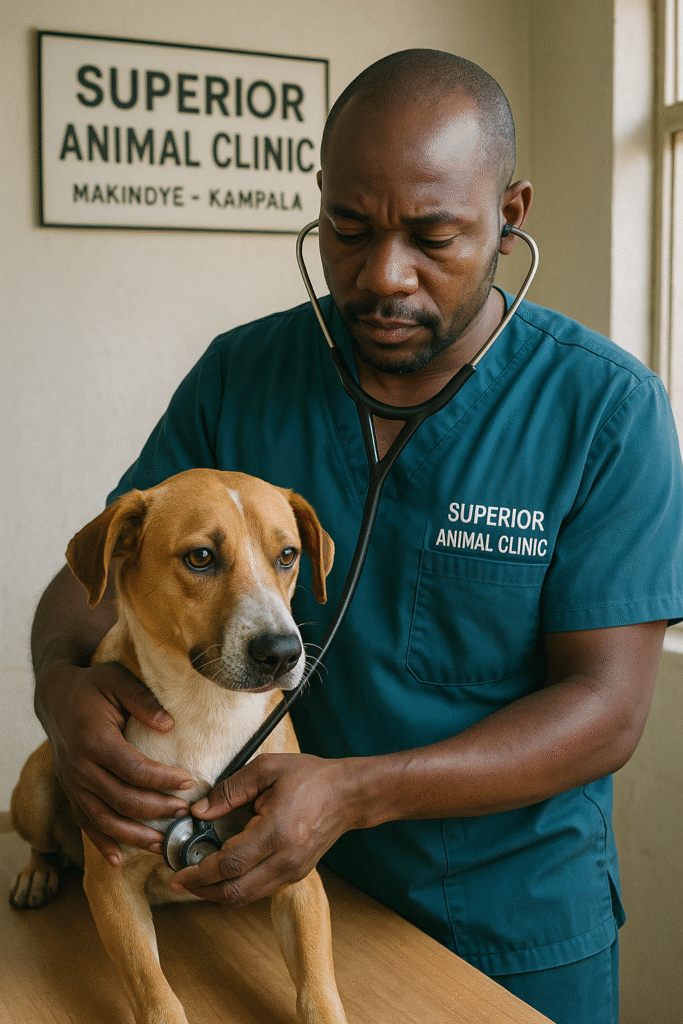
7. Predisposing Lifestyle Factors
Dogs that are:
- Free-roaming or allowed to wander outside unsupervised
- Fed outdoors in unclean environments
- Kept in kennels with poor drainage
…are all more likely to come into contact with the bacteria.
Key Takeaway for Dog Owners in Uganda
Leptospirosis is largely preventable with proper care, vaccination, and environmental management. Dog owners should be aware of these risk factors.
At Superior Animal Clinic, we guide dog owners on how to minimize exposure, vaccinate their pets, and create safe living environments, reducing the risk of Leptospirosis dramatically.
Dogs Most Prone to Leptospirosis
Some dogs are more susceptible:
- Puppies and young dogs – weaker immune systems
- Outdoor dogs – frequent contact with water and soil
- Dogs in flood-prone areas – especially in Makindye, Rubaga, and Nakawa
- Unvaccinated dogs – vaccination reduces risk
At Superior Animal Clinic, we always recommend preventive care for dogs at higher risk.
Best Treatment and Drugs for Leptospirosis in Dogs in Uganda
Leptospirosis is a serious bacterial infection, but with timely and proper treatment, dogs can recover fully. At Superior Animal Clinic, we follow a comprehensive approach that combines effective drugs, supportive care, and careful monitoring to ensure the best outcomes for dogs.
Step 1: Thorough Diagnosis
Before starting treatment, our veterinarians perform:
- Physical examination – checking for fever, jaundice, dehydration, and lethargy.
- Blood tests – to detect antibodies and assess kidney and liver function.
- Urine tests – to confirm presence of Leptospira bacteria.
- Additional tests – to rule out other diseases with similar symptoms.
Accurate diagnosis ensures that the treatment is targeted and effective.
Step 2: Administering the Right Antibiotics
Antibiotics are the primary treatment for Leptospirosis. At Superior Animal Clinic, we use:
- Doxycycline – the most effective antibiotic to kill Leptospira bacteria.
- Penicillin – often used in combination with Doxycycline for severe cases.
- Amoxicillin – used in mild cases or as supportive therapy.
Administration method:
- Oral antibiotics for mild cases at home.
- Injectable antibiotics for severe cases, especially when dogs are hospitalized.
Step 3: Supportive Care
Leptospirosis can affect kidneys and liver, so supportive care is crucial:
- IV Fluids – to correct dehydration, electrolyte imbalances, and kidney stress.
- Anti-nausea medication – to manage vomiting and maintain nutrition.
- Liver support supplements – protect and restore liver function.
- Pain management – to ease muscle or joint discomfort.
Dogs with severe symptoms may need hospitalization for 3–7 days, depending on the severity of organ involvement.
Step 4: Nutritional Support
Nutrition plays a key role in recovery:
- Easily digestible foods – boiled chicken, rice, or veterinary-prescribed diets.
- Small, frequent meals – help maintain energy without overloading the digestive system.
- Hydration – encourage drinking clean water to support kidney recovery.
At Superior Animal Clinic, we provide dietary guidance to dog owners for the entire recovery period.
Step 5: Monitoring and Follow-Up
Recovery doesn’t end after antibiotics:
- Regular follow-up visits – to check kidney and liver function.
- Repeat blood and urine tests – ensure the infection is completely cleared.
- Vaccination planning – to prevent future infections.
Our team at Superior Animal Clinic guides dog owners throughout this process, ensuring your pet recovers fully and safely.
Step 6: Prevention After Treatment
Even after recovery, prevention is key:
- Leptospirosis vaccination – especially for dogs in high-risk areas like Makindye, Nakawa, Rubaga, Muyenga, Kololo, Bugolobi, and Ntinda.
- Avoiding stagnant water – particularly after heavy rains or floods.
- Rodent control and hygiene – keep yards, kennels, and feeding areas clean.
Key Takeaway for Dog Owners in Kampala
Dogs treated promptly at Superior Animal Clinic using the right combination of antibiotics, supportive care, and nutritional support have excellent recovery rates.
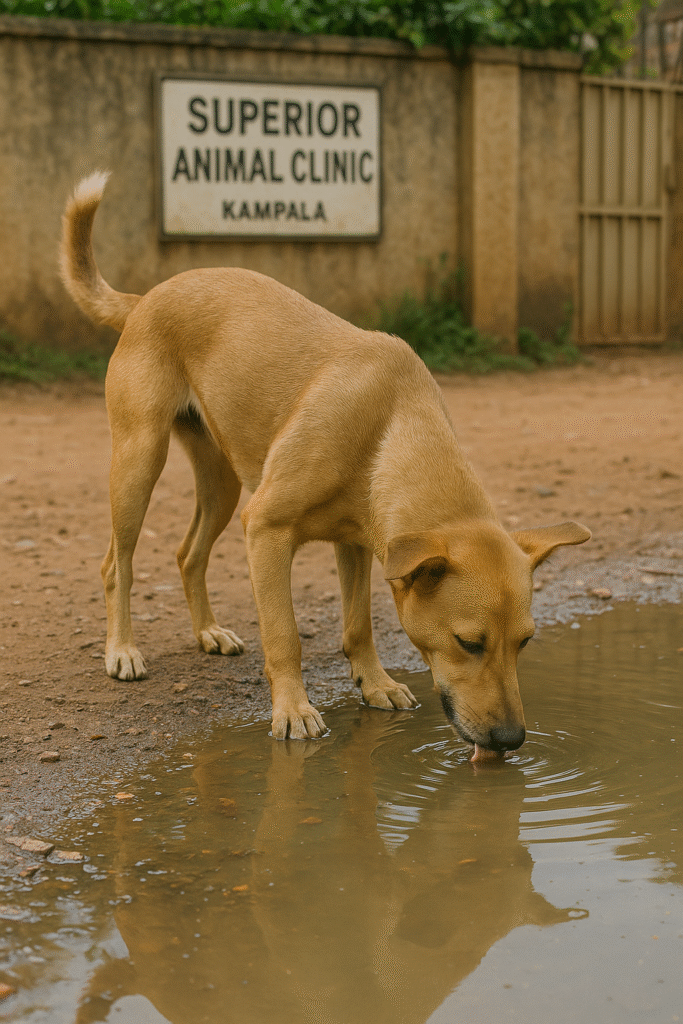
Prevention and Home Care for Leptospirosis in Dogs in Uganda
Preventing Leptospirosis is always better than treating it. At Superior Animal Clinic, we guide dog owners across Makindye, Nakawa, Rubaga, Muyenga, Kololo, Bugolobi, Ntinda, Old Kampala, and surrounding neighborhoods on how to protect their pets from this serious infection. By combining prevention strategies, safe home care, and veterinary guidance, you can drastically reduce your dog’s risk.
1. Vaccination: The Most Effective Protection
Leptospirosis vaccines are highly recommended for dogs in Uganda, especially for:
- Puppies and young dogs
- Outdoor or free-roaming dogs
- Dogs living in flood-prone areas like Makindye, Rubaga, Nakawa, and Muyenga
- Working or guard dogs exposed to wildlife or livestock
Superior Animal Clinic offers safe and effective Leptospirosis vaccines, along with personalized schedules based on your dog’s age and risk factors.
2. Avoiding Contaminated Water and Soil
Since Leptospirosis bacteria thrive in water and mud, you should:
- Keep your dog away from puddles, ponds, rivers, and floodwater
- Avoid allowing dogs to drink from open water sources in high-risk neighborhoods
- Provide clean, fresh water at home at all times
Dogs in Makindye, Nakawa, Rubaga, Muyenga, and Kololo are particularly vulnerable during rainy seasons, so extra care is needed.
3. Hygiene and Rodent Control
Leptospirosis spreads through urine of infected animals, especially rodents. To protect your dog:
- Clean your dog’s bedding, bowls, and play areas regularly
- Maintain clean backyards and kennels
- Use safe rodent control methods to limit exposure to infected urine
4. Monitoring Your Dog at Home
Even with preventive measures, early detection is crucial. Watch your dog for:
- Fever or shivering
- Loss of appetite
- Vomiting or diarrhea
- Increased thirst and urination
- Lethargy or unusual behavior
If you notice any of these signs, bring your dog to Superior Animal Clinic immediately. Early treatment significantly improves recovery.
5. Nutrition and Supportive Home Care
For dogs recovering from Leptospirosis, home care is essential:
- Provide light, digestible meals: boiled chicken, rice, or vet-recommended diets
- Offer small, frequent meals to maintain energy
- Ensure plenty of fresh water to support kidney and liver function
- Keep your dog resting in a clean, dry environment
At Superior Animal Clinic, we provide detailed home care plans for every dog recovering from Leptospirosis.
6. Seasonal and Environmental Awareness
Dog owners in flood-prone neighborhoods like Makindye, Rubaga, Nakawa, and Muyenga should take extra precautions during rainy seasons, when puddles and standing water increase the risk of infection.
7. Regular Veterinary Checkups
Even healthy dogs should have regular veterinary checkups, especially in high-risk areas. These visits allow:
- Early detection of infections
- Timely vaccinations
- Personalized advice on diet, hygiene, and environmental safety
Key Takeaway for Dog Owners in Kampala
By combining vaccination, clean environments, rodent control, careful monitoring, and supportive home care, dog owners can dramatically reduce the risk of Leptospirosis in their pets.
Superior Animal Clinic is here to guide you every step of the way, providing vaccinations, early detection, and personalized home care advice to ensure your dog stays healthy and protected.
Prognosis: What Happens If Untreated
Without treatment, Leptospirosis can lead to:
- Kidney failure
- Liver damage
- Severe dehydration
- Death in severe cases
This is why dog owners across Kampala trust Superior Animal Clinic for early diagnosis and expert treatment.
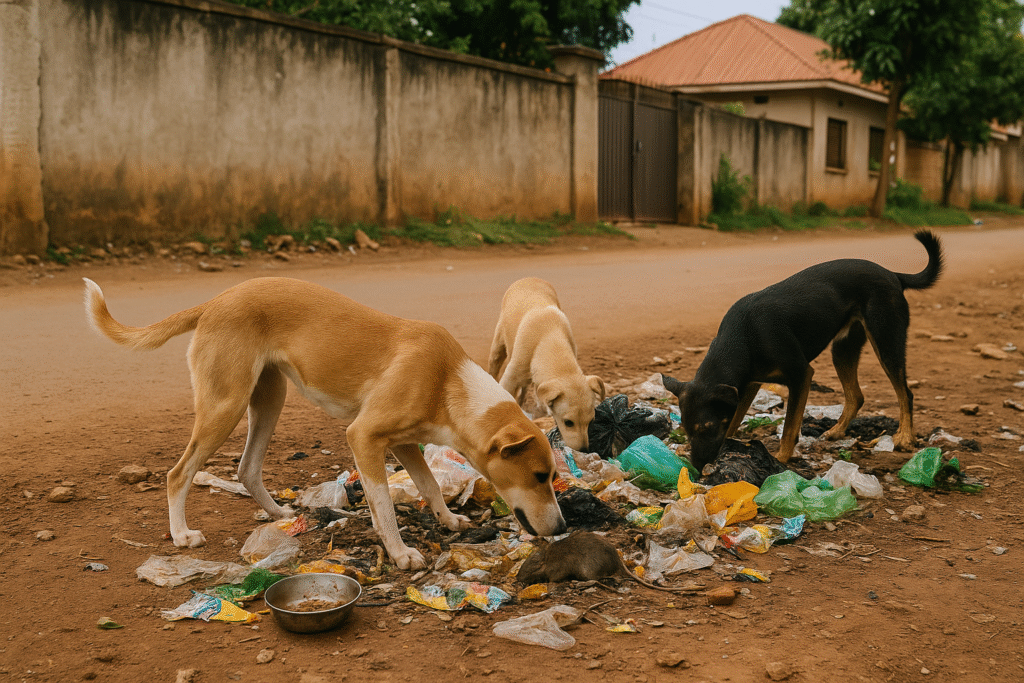
FAQs About Leptospirosis in Dogs in Kampala
1. How much does Leptospirosis treatment cost in Kampala?
The cost of Leptospirosis treatment in Kampala depends on your dog’s severity of infection, required tests, hospitalization, and medications. At Superior Animal Clinic in Makindye, we offer affordable and transparent pricing for all neighborhoods for a detailed quote tailored to your dog. Ranging from UGX 125000 to 450,000
2. Who is the best vet for treating Leptospirosis in Kampala?
Dog owners across Makindye, Nakawa, Rubaga, Kololo, Bugolobi, Ntinda, Old Kampala, and surrounding areas trust Superior Animal Clinic for Leptospirosis treatment. Our experienced veterinarians, modern diagnostic tools, and comprehensive treatment plans make us the top choice for canine Leptospirosis care in Kampala.
3. Where can I get the Leptospirosis vaccine for my dog in Kampala?
The Leptospirosis vaccine is available at Superior Animal Clinic on Salaama Road, Makindye. We provide vaccines for dogs of all ages and guide owners from Ntinda, Old Kampala, Kasubi, Nsambya, Kololo, Muyenga, Nakawa, and Makindye on the best vaccination schedule to prevent infection.
4. What is the price of the Leptospirosis vaccine in Kampala?
The cost of the Leptospirosis vaccine is UGX 60,000 in Uganda at Superior Animal Clinic
5. Which is the best veterinary hospital for Leptospirosis in Kampala?
For dog owners looking for the best veterinary hospital for Leptospirosis in Kampala, Superior Animal Clinic stands out. We provide:
- Expert veterinarians specialized in canine infectious diseases
- Advanced diagnostic tests for early detection
- Comprehensive treatment and follow-up care
- Vaccinations and preventive advice
Our clinic serves dogs from Makindye, Nakawa, Rubaga, Muyenga, Kololo, Bugolobi, Ntinda, Old Kampala, and all surrounding neighborhoods, ensuring your dog receives life-saving care and personalized attention.
6. How do I know if my dog needs Leptospirosis treatment?
Watch for symptoms like fever, vomiting, diarrhea, lethargy, jaundice, increased thirst, and frequent urination. If your dog shows any combination of these signs, take them immediately to Superior Animal Clinic in Makindye for diagnosis and treatment. Early intervention is key to full recovery.
7. Can Leptospirosis be prevented in dogs?
Yes! Vaccination, clean living environments, avoiding stagnant water, rodent control, and regular vet checkups are the best ways to prevent Leptospirosis. Superior Animal Clinic provides both vaccines and preventive guidance for dog owners in all Kampala neighborhoods, ensuring your dog stays healthy and protected.
8. What are the first signs of Leptospirosis in dogs that I should look out for?
The early symptoms of Leptospirosis in dogs include fever, tiredness, vomiting, diarrhea, muscle pain, and loss of appetite. Some dogs may also show yellow eyes (jaundice) or bloody urine. If you see any of these signs, visit Superior Animal Clinic in Makindye for a proper check-up. Early detection can save your dog’s life.
9. Can Leptospirosis spread from dogs to humans in Uganda?
Yes. Leptospirosis is a zoonotic disease, meaning it can spread from dogs to humans through contact with infected urine or contaminated water. That’s why prompt treatment and vaccination at Superior Animal Clinic are essential to protect both your pet and your family in Kampala, Ntinda, Nakawa, Rubaga, and nearby areas.
10. How long does treatment for Leptospirosis take in dogs?
Treatment duration depends on the severity of infection and how early it’s detected. Most dogs require antibiotic therapy for 2–4 weeks and supportive care for several days. Dogs treated early at Superior Animal Clinic in Makindye usually recover faster and avoid kidney or liver complications.
11. Is Leptospirosis treatment available 24/7 in Kampala?
Yes! Superior Animal Clinic offers emergency veterinary services in Kampala for dogs suffering from Leptospirosis and other serious infections. Whether you are in Makindye, Munyonyo, Rubaga, Muyenga, or Kololo, you can reach us anytime at +256771909946 (also on WhatsApp) for emergency assistance.
12. What types of dogs are more at risk of Leptospirosis in Uganda?
Dogs that are outdoor pets, hunting dogs, guard dogs, or those that roam freely are at higher risk. Breeds that love water or live in areas like Makindye, Nakawa, Rubaga, and Muyenga, where flooding and rodents are common, are also more vulnerable. Superior Animal Clinic offers targeted vaccination programs for these high-risk dogs.
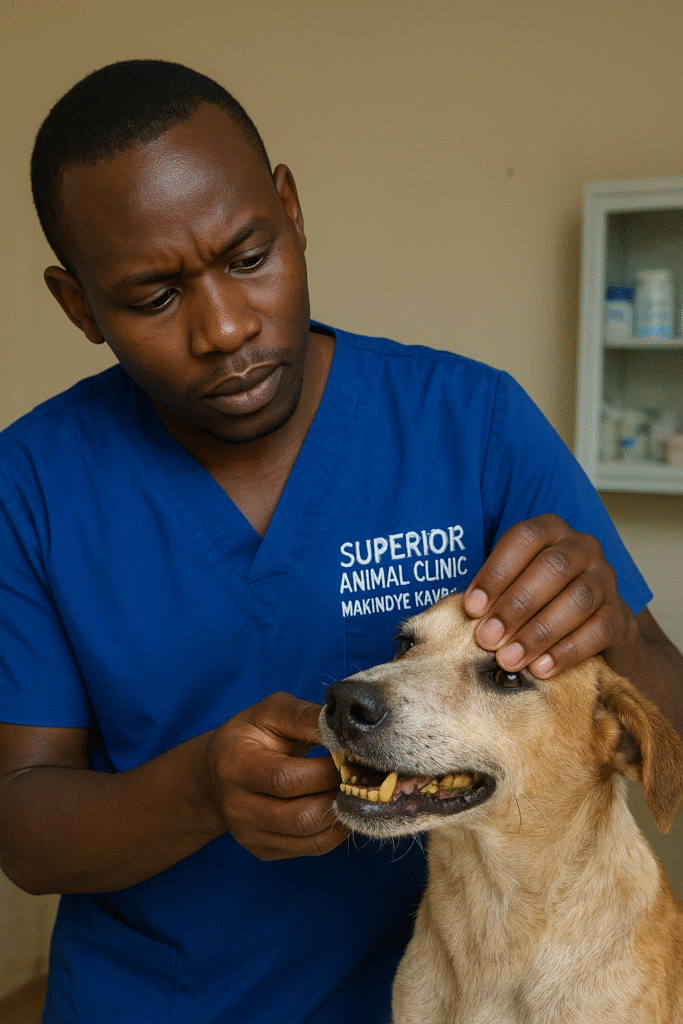
13. Can home remedies cure Leptospirosis in dogs?
Home remedies cannot replace veterinary treatment, but they can support recovery after a vet’s care. You can give boiled chicken and rice, keep your dog hydrated, and ensure a clean, quiet space. However, always visit Superior Animal Clinic in Makindye for diagnosis and proper antibiotics — untreated Leptospirosis can be fatal.
14. What should I feed a dog recovering from Leptospirosis?
Feed your recovering dog light, easy-to-digest meals such as boiled chicken, white rice, and cooked pumpkin. Avoid oily or salty foods. Our veterinarians at Superior Animal Clinic can recommend nutritional supplements and prescription diets to support your dog’s liver and kidney recovery.
15. How often should my dog be vaccinated against Leptospirosis?
Dogs should receive the Leptospirosis vaccine once a year. Puppies can start as early as 8–12 weeks old, with a booster a few weeks later. Schedule your dog’s vaccination at Superior Animal Clinic in Makindye, serving all of Kampala and surrounding areas.
16. What should I do if my dog has been exposed to contaminated water or rats?
If your dog has been in contact with stagnant water, mud, or rodent-infested areas, bring them to Superior Animal Clinic immediately for preventive antibiotics and testing. Early intervention can stop the disease before it spreads in the body.
17. Can Leptospirosis come back after treatment?
Yes, relapse can occur if the infection wasn’t fully cleared or if your dog is re-exposed to contaminated areas. To prevent recurrence, ensure complete antibiotic treatment, regular follow-ups at Superior Animal Clinic, and annual vaccination.
18. Is Leptospirosis common in Kampala?
Yes, Leptospirosis is relatively common in Kampala, especially in flood-prone and rodent-dense neighborhoods like Makindye, Rubaga, Nakawa, Muyenga, and Bugolobi. Regular vaccination and avoiding stagnant water are essential preventive steps.
19. Can Leptospirosis be completely cured in dogs?
Yes — with early diagnosis and proper veterinary care, most dogs recover completely. At Superior Animal Clinic, we use effective antibiotics, IV fluids, and supportive therapy to ensure full recovery and long-term health.
20. What should I do if I suspect my dog has Leptospirosis?
Don’t wait — contact Superior Animal Clinic immediately at +256771909946. Our team will guide you on first aid, safe handling, and immediate next steps to protect both your dog and your household. We serve dog owners from Makindye, Ntinda, Kololo, Muyenga, Bugolobi, Rubaga, and all surrounding areas.
Why Choose Superior Animal Clinic for Leptospirosis Treatment in Kampala
- Experienced veterinarians specialized in canine infectious diseases
- State-of-the-art diagnostics and lab facilities
- Comprehensive treatment plans including hospitalization and follow-up care
- Convenient location in Makindye, serving all neighborhoods of Kampala
- Affordable and effective drugs for Leptospirosis in Uganda
When searching for the best dog vet in Kampala, dog owners in Ntinda, Old Kampala, Kasubi, Nsambya, Katwe, Zanta, Nakasero, Mityana, Makindye, Buziga, Munyonyo, Nakawa, Rubaga, Muyenga, Naguru, Bugolobi, Kabowa, Kabojja, Lugogo, Lubowa, Seguku, Ndejje, Kololo, Mutundwe, Bukoto, Bulindo, and Kulambiro consistently choose Superior Animal Clinic for Leptospirosis care.
Contact Superior Animal Clinic
If you notice any symptoms of Leptospirosis in your dog or want to vaccinate your dog against Leptospirosis, visit Superior Animal Clinic on Salaama Road, Makindye, Kampala or call +256771909946 (also on WhatsApp). Your dog deserves the best veterinary care in Uganda, and we are here to provide it.
